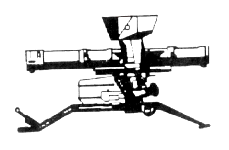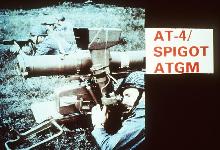





The first concrete evidence of the existence of second-generation Soviet ATGMs was a 1975 report in a Yugoslav military periodical that an ATGM called FAGOT had recently appeared in the Warsaw Pact forces. Subsequently, it was reported that the FAGOT first entered service in 1972. The man-portable FAGOT system has now been given the NATO nickname SPIGOT and the US designation AT-4. The BRDM-mounted AT-5/SPANDREL was at one time misidentified as the FAGOT, and the missiles are indeed quite similar.
Introduced in the mid-1970s, the SPIGOT was designed primarily to replace AT- 3 SAGGER man-packed missiles. The SPIGOT has a number of improvements over the SAGGER including a smaller but more lethal warhead, SACLOS guidance that gives a 90 percent probability of a first round hit, a speed of 183 meters per second that propels the missile to its maximum range in just 11 seconds, and minimum range of only 70 meters. While meant to be a primarily a man-pack missile, the SPIGOT may be mounted on the BMP and BMD in place of the SAGGER.
Because of its weight, the Russians categorize the AT-4/4B system as portable (21-40 kg) rather than manportable. For dismounted carry load is divided among three packs. Due to the greater weight, AT-5/-5B fits into the "heavy" class (40+ kg), and should only be carried short distances from vehicles (<500 meters). For crews using both ATGM classes and operating near vehicles, combat load is 8 (4 stowed in the vehicle).
The AT-4/SPIGOT is a tube-launched, semiautomatic command-to-line-of-sight (SACLOS), antitank guided missile system with a HEAT warhead. The SPIGOT launch tube, in which the missile is stored and carried, is 1,200 mm long, 134 mm in diameter, and weighs 5 kg. The missile itself is estimated to have slightly smaller dimensions and a weight of 7 kg. This tripod-mounted, wire-guided ATGM, similar in many respects to the US TOW system, was deployed as a direct replacement for the man-portable SAGGER, and to replace SAGGERs on the BMP and BMD as well.
The SPIGOT has a minimum range of only 70 meters and a maximum range of 2,000 meters. Missile speed is estimated at 185 meters per second, with a maximum flight time of 11 seconds. The warhead, which is probably smaller than that of the SAGGER, has an armor penetration capability of 500 to 600 mm. Probability of first-round hit should be at least the same as for the AT-3c semiautomatic SAGGER (90 percent).
The SACLOS guidance system increases accuracy and reduces operator training requirements, since it is no longer necessary for the operator to track target and missile simultaneously. The operator keeps his sight trained on the target while the missile is tracked automatically. The deviation between the missile's path and the operator's line-of-sight is measured by an IR tracking apparatus, the IR source being in the tail of the missile. An apparatus at the control site then generates guidance commands which are transmitted to the missile by wire, causing the missile to eliminate the deviation.
The requirement that the missile launcher of a SACLOS system be collocated with the aiming and tracking assembly (i.e., the operator) eliminates the possibility of moving the operator to a remote position for safety.
The antitank platoon of a BTR-equipped motorized rifle battalion has two ATGM squads. Each squad has two SPIGOT firing teams. In each three-man team, the gunner carries the launcher and tripod as a backpack, and the two bearers each carry two launch tubes as backpacks. All three men carry an assault rifle, but no RPG-16, since the SPIGOT does not have the 500-meter deadspace of the SAGGER.
The AT-4B/Factoria is an upgrade ATGM with a 2,500 meter range, 550-mm penetration, and a velocity of 180 m/s (13.2 - 14.0 sec TOF). Russian firms have developed counter-countermeasures, such as encoded-pulse beacons for ATGMs and counter-dazzler adjustments to the 9S451M1 guidance box. Filters can be mounted in front of reticles. TPVP/1PN65 thermal sight is available, with the range approximately 2,500 meters. Weight is 13 kg. Slovenian TS-F sight and Russian 1PN86-1/1PN86/Mulat have a 3,600 meter detection range.
Currently, the Russian Army employs the BRDM-2/AT-5 ATGM variant carrying either SPIGOT (normally for the AT-4 system) or longer-ranged SPANDREL missiles. This system is antiquated by modern standards, and lacks the mobility, armor protection, and effectiveness needed on the modern battlefield. The Russian Army is faced with the option of purchasing the BMP-3 mounted AT-14 Kornet system, which is a follow-on to the AT-5, or the more expensive AT-15 Khrizantema, a more powerful system capable of engaging more targets at greater ranges.
Specifications | ||||||||||||||||||||
| Alternative Designations | 9P135M Firing Post, Fagot/Fagot-M | |||||||||||||||||||
| Date of Introduction | 1973 | |||||||||||||||||||
| Proliferation | At least 25 countries, including : former Soviet Republics, Czechoslovakia, Poland, Syria. | |||||||||||||||||||
| Description | ||||||||||||||||||||
| Crew | 3 | |||||||||||||||||||
| Primary Mount | Ground mount on folding tripod | |||||||||||||||||||
| Alternate Mounts | Pintel (post) on BMP-1P, BTR-D, UAZ-469, etc. | |||||||||||||||||||
| Weight Overall, Excluding Missile (kg) | 22.5 | |||||||||||||||||||
| Length Overall in Firing Position (m) | 1.1/1.3 AT-4/5 tube | |||||||||||||||||||
| Height Overall In Firing Position (m) | INA | |||||||||||||||||||
| Width Overall In Firing Position (m) | INA | |||||||||||||||||||
| ARMAMENT | ||||||||||||||||||||
| Launcher Name | 9P135 (AT-4 only), 9P135M (AT-4/AT-5), -M1, -M2, -M3 | |||||||||||||||||||
| Launch Method | Tube-launched | |||||||||||||||||||
| Elevation (�) (-/+) | INA | |||||||||||||||||||
| Rate of Launch (missiles/min) | 2-3, depending on range | |||||||||||||||||||
| Reaction Time (sec) | INA | |||||||||||||||||||
| Emplacement Time (min) | INA | |||||||||||||||||||
| Displacement Time (min) | INA | |||||||||||||||||||
| Ready/Stowed Missiles | 4/0 full dismount, 4/4 on or near vehicle | |||||||||||||||||||
| FIRE CONTROL | ||||||||||||||||||||
| FCS Name | 9S451M1 Guidance control box | |||||||||||||||||||
| Guidance | SACLOS | |||||||||||||||||||
| Command Link | Wire | |||||||||||||||||||
| Beacon Type | Incandescent infrared bulb | |||||||||||||||||||
| Tracker Type | IR, 9S451M1 | |||||||||||||||||||
| Susceptible To Countermeasures | EO jammers, smoke, counterfire | |||||||||||||||||||
| Counter-countermeasures | EO jamming alarm | |||||||||||||||||||
| Rangefinder | INA | |||||||||||||||||||
| Sights w/Magnification | ||||||||||||||||||||
| Gunner | ||||||||||||||||||||
| Day | 9Sh119M1, 4x | |||||||||||||||||||
| Field of View (�) | 4.5 | |||||||||||||||||||
| Acquisition Range (m) | INA | |||||||||||||||||||
| Night | Available | |||||||||||||||||||
| AMMUNITION | ||||||||||||||||||||
| Antitank Guided Missiles | ||||||||||||||||||||
|
Name | AT-4/SPIGOT |
Alternative Designations | Fagot |
Missile Weight (kg) | 13.0 (in tube) |
Warhead Type | Shaped Charge (HEAT) |
Armor Penetration (mm) | 480 |
Minimum/Maximum Range (m) | 70/2,000 |
Probability of Hit (%) | 90 |
Average Velocity (m/s) | 186 |
Time of Flight to Max Range (sec) | 11 |
Other Missiles | AT-4B/Factoria
| |

